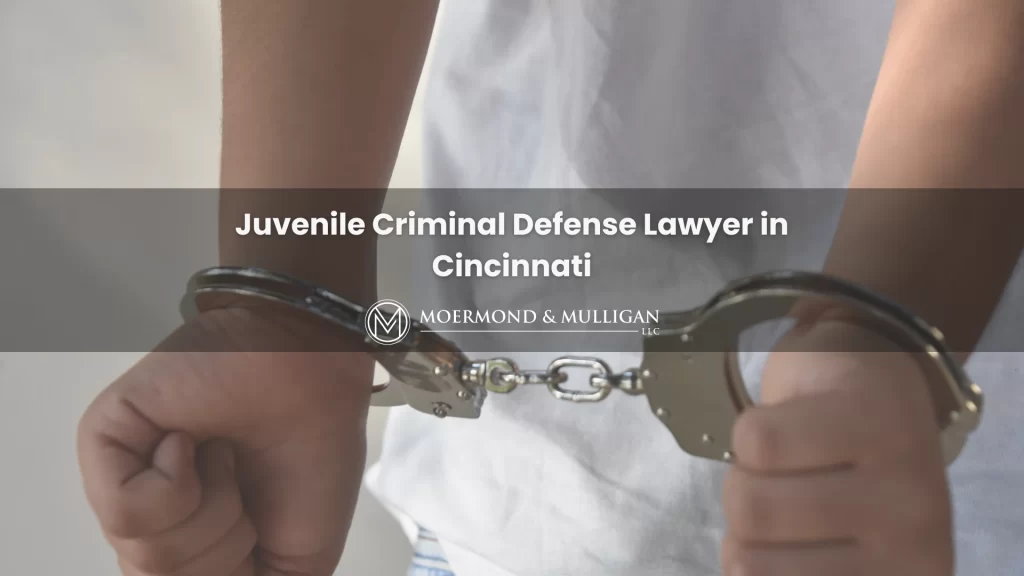
If your child or teenager has been accused of a crime in Ohio, it’s wise to hire a juvenile crime lawyer in Cincinnati to defend them. The outcome of a juvenile case, even though it goes through the juvenile court, can still have a significant impact on a child’s future, affecting their educational and employment opportunities.
We at Moermond & Mulligan, LLC understand this is an overwhelming time for you and your child. Our Cincinnati juvenile criminal defense lawyers are here to help. Contact us online or call (513) 421-9790 today. We work on a contingency fee basis, so you pay nothing unless your case is a success.
Who Qualifies as a Juvenile in the Ohio Juvenile Court System?
A juvenile in Ohio law is typically someone under the age of 18. If a child under 18 years of age gets into legal trouble, the Ohio juvenile court system will usually handle their case.
Some juvenile cases in Ohio are transferred to the adult court system. Usually, though, a juvenile’s case can’t become an adult case if they are under 14 years of age.
Types of Offenses That Land You in Ohio Juvenile Court
According to the Mahoning County of Ohio, someone under the age of 18 in Ohio may find themselves in juvenile court for one of the following types of acts:
- Delinquent acts
- Unruly acts
Common juvenile offenses in Ohio include theft, assault, and drug possession.
A delinquent act is one that a court would typically prosecute as a crime if the individual committing it was an adult. For example, trespassing as a juvenile is a delinquent act.
An unruly act is one that is only a legal matter because of a juvenile’s age. If they were an adult, the act would not be a crime and would not land them in court. An example of a common unruly act is truancy.
What Does the Juvenile Justice System Process Involve in Ohio?
According to Voices for Ohio’s Children, the juvenile court process in Ohio is a part of the broader criminal justice system and usually involves these steps:
- The police arresting a juvenile or contacting them based on valid suspicion of an illegal act
- The police releasing a juvenile to their parents/guardians or holding them for processing, depending on the nature of the act
- A juvenile court intake officer deciding if the matter should go to juvenile court or if a community-based program would better handle the issue
- Officially filing a complaint in juvenile court and issuing a summons indicating the child and their custodian must appear in court
- A detention hearing to determine whether a child needs to be brought into detention or whether an alternative is appropriate
- An arraignment, during which a child will enter a plea
- Pretrial hearings, such as competency hearings, which may not always be necessary
- An adjudicatory hearing, during which a judge determines whether a child committed the act for which they’re facing charges
- A dispositional hearing, which is essentially the Ohio juvenile court version of sentencing
The above process can vary depending on several details. For example, a child may admit to the act for which they’ve been charged. If they do so, steps like the adjudicatory hearing aren’t necessary. Admitting they committed an act might be worthwhile for a child if their lawyer has secured a reasonable plea bargain.
Be aware that the rights of a juvenile in the criminal justice system aren’t always the same as those of an adult. For example, juveniles do have the right to attorneys. However, they don’t necessarily have a right to be released on bail before their detention hearings.
Detention Options for Juvenile Offenders in Ohio
A child may remain in a juvenile detention center before their detention hearing after the police take them into custody in Ohio. At a detention hearing, the court will determine whether a child should remain in detention while their case is pending. Factors the court will consider when making this decision include:
- Whether a child is a danger to themselves or others
- Whether keeping a child detained is better for their safety
- Whether there’s reason to suspect a child will flee the court’s jurisdiction
- Whether the parents or guardians of a child are able to supervise them while their case is pending
A juvenile detention center isn’t the only option the court may consider. For example, instead of detaining a child, a court may determine that electronic monitoring of their whereabouts is sufficient. Or a child may have to go to a reporting center to check in at certain times while their case plays out.
Common Examples of Juvenile Delinquency Offenses
A juvenile’s age will usually influence the types of crimes or illegal acts they may engage in. For example, a juvenile is more likely to commit petty theft than white collar crimes.
Common examples of delinquent acts that land young people in Ohio’s juvenile court system include:
- Drug possession
- Traffic violations
- Alcohol possession
- Fake ID possession
- Underage drinking
Juvenile law may be more forgiving than the adult court system. However, any type of legal trouble is a serious matter. Contact a Cincinnati juvenile crime attorney if your child is facing such trouble.
When Is Someone Not a Juvenile in Ohio?
There are circumstances in which a juvenile court in Ohio can or must transfer a case to adult court. For example, under Ohio law, this is a requirement in cases involving acts that would qualify as any of the following crimes if an adult committed them:
- Aggravated murder
- Murder
- Attempted aggravated murder
- Attempted murder
In these circumstances, the juvenile court must transfer a case to an adult court if any of the following apply:
- The juvenile was 16 or 17 when they allegedly committed the act in question, and there is probable cause to believe they may be guilty.
- The juvenile was 14 or 15 years of age when they allegedly committed the act in question and have previously been found delinquent (the juvenile equivalent of being found guilty) of a category one or category two offense.
That’s just one example of an instance in which the Ohio court system must transfer a juvenile case to an adult court. Under Ohio law, there are other instances in which doing so is mandatory. Additionally, there may be instances in which the court determines it’s necessary to transfer a case. The court may make this decision if there’s reason to believe the juvenile court system won’t successfully rehabilitate someone.
What Is the Maximum Sentence for a Juvenile?
The penalties juveniles can face in Ohio vary widely depending on the nature of their illegal acts. Under Ohio law, it’s not uncommon for courts to order juveniles to pay fines. The maximum fine a juvenile court may order a child to pay is $2,000.
A court may order a juvenile to perform community service if they’re unable to pay a fine. In cases involving traffic violations, courts sometimes order juveniles to pay restitution to injured parties.
In Ohio’s juvenile court system, the longest a child may stay in a detention facility is 90 days.
Rights of a Juvenile Offender in Ohio
Juvenile offenders in Ohio have certain rights that are protected by law. These rights include:
- The right to an attorney: Juvenile offenders have the right to be represented by an attorney throughout the court process.
- The right to due process: Juvenile offenders have the right to a fair and impartial hearing, where they can present evidence and witnesses in their defense.
- The right to protection from self-incrimination: Juvenile offenders have the right to remain silent and not incriminate themselves during questioning.
- The right to a Guardian Ad Litem: In some cases, the court may appoint a Guardian Ad Litem to ensure that the juvenile offender’s rights are protected and that they receive effective representation.
It’s essential for parents and guardians to understand the rights of a juvenile offender in Ohio and to seek the advice of an experienced criminal defense attorney in Cincinnati if their child is facing juvenile criminal charges. A skilled juvenile crime attorney in Cincinnati can help ensure that the young offender’s rights are protected and that they receive the best possible outcome.
Juvenile Sentencing
Ohio law allows other potential juvenile penalties, including:
- Temporary placement in an institution (such as a school or camp) with the legal authority to handle juvenile cases
- Placement in a juvenile detention facility
- Community control
- Basic probation
- Intensive probation
- Day reporting, which involves reporting to an assigned reporting center on a court-ordered schedule
- Up to 500 hours of community service
- The requirement that they complete their high school education or other such form of vocational training
- A requirement of finding employment
- Drug/alcohol monitoring
- Drug/alcohol assessment and counseling
- A curfew
- Monitored time
- House arrest with electronic monitoring or ongoing alcohol monitoring
A juvenile sentence may include combinations of these penalties.
Do You Need a Lawyer for Juvenile Court in Ohio?
- Understanding your rights and having a strong juvenile defense is important in any criminal case. However, it’s particularly important when a child is facing charges. They need a proper defense to avoid being taken advantage of.
However, as the above information demonstrates, Ohio’s juvenile court process differs from the adult court process in numerous ways. A child’s lawyer needs to be familiar with the nuances of the system to provide them with a quality defense. An experienced Cincinnati juvenile criminal defense attorney can assist your child and you by:
- Showing that the evidence against your child is flimsy when possible
- Speaking on your child’s behalf during all court proceedings
- Securing a favorable plea bargain
- Demonstrating why the penalties your child may face shouldn’t be severe
- In some cases, showing why a case shouldn’t be transferred to adult court
At the very least, a Cincinnati juvenile criminal defense attorney can offer professional assistance at a time when you and your child may have many questions. Their assistance can offer substantial peace of mind. In other instances, a lawyer may prevent a child from being tried as an adult and having a criminal record.
Contact a Cincinnati Juvenile Criminal Defense Lawyer
Taking action fast is important if your child or teen has been accused of a crime in Cincinnati. Hiring an attorney is key to ensuring someone is protecting their rights every step of the way.
At Moermond & Mulligan, LLC, a Cincinnati juvenile criminal defense attorney familiar with these types of cases can offer the appropriate defense your child needs now. Learn more by contacting us online or calling our legal team at (513) 421-9790 for a free consultation where we can discuss your child’s case. Learn more about our previous cases and how we can help your child.
Related Posts:
Last Updated: 06-09-2025
